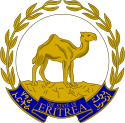
Back الجبهة الشعبية للديمقراطية والعدالة Arabic Folkets front for demokrati og retfærdighed Danish Volksfront für Demokratie und Gerechtigkeit German Frente Popular por la Democracia y la Justicia Spanish Front populaire pour la démocratie et la justice French Narodni front za demokraciju i pravdu Croatian Front Rakyat untuk Demokrasi dan Keadilan ID Fronte Popolare per la Democrazia e la Giustizia Italian 民主正義人民戦線 Japanese Volksfront voor democratie en rechtvaardigheid Dutch
This article has multiple issues. Please help improve it or discuss these issues on the talk page. (Learn how and when to remove these template messages)
|
People's Front for Democracy and Justice ህዝባዊ ግንባር ንደሞክራስን ፍትሕን | |
|---|---|
 | |
| Abbreviation | PFDJ |
| Chairperson | Isaias Afwerki |
| Secretary | Woldemichael Abraha |
| Spokesperson | Yemane Ghebreab |
| Founded | 16 February 1994 |
| Preceded by | Eritrean People's Liberation Front |
| Headquarters | Asmara, Zoba Maekel |
| Newspaper | Shabait |
| Youth wing | Young People's Front for Democracy and Justice |
| Ideology | Eritrean nationalism[1] Left-wing nationalism[1] Secularism[2] Militarism[3] Factions: Socialism[4] |
| Political position | Big tent[5] |
| Seats in the National Assembly | 75 / 150 |
| Party flag | |
 | |
| Website | |
| shaebia.org (Archived) | |
 |
|---|
| Constitution (not enforced) |
| Elections |
|
|
The People's Front for Democracy and Justice (Tigrinya: ህዝባዊ ግንባር ንደሞክራስን ፍትሕን, PFDJ) is the founding, ruling, and sole legal political party of the State of Eritrea. The successor to the Marxist–Leninist Eritrean People's Liberation Front (EPLF), the PFDJ regards itself as a left-wing nationalist party, though it holds itself open to nationalists of any political affiliation.[5] The leader of the party and current President of Eritrea is Isaias Afwerki. The PFDJ has been described as totalitarian,[6][7][8][9] and under its rule Eritrea reached the status of the least electorally democratic country in Africa according to V-Dem Democracy indices in 2023.[10][11]
- ^ a b O'Kane, David; Hepner, Tricia (2011), Biopolitics, Militarism, and Development: Eritrea in the Twenty-First Century, Berghahn Books, p. xx, ISBN 9780857453990, retrieved 15 January 2011
- ^ Joireman, Sandra Fullerton (2003), Nationalism and Political Identity, Continuum, p. 133, ISBN 9780826465917, retrieved 15 January 2011
- ^ Gebrekidan, Desalegn Abraha (May 2014). The Leadership Hypocrisy of Four Million Parties and its Insurmountable Consequences on the Political Dimension of Nation Building: An Illustration of the so called “Peoples Front for Democracy and Justice (PFDJ) Central Office in Eritrea” (PDF). 15th International Academy of African Business and Development Annual Conference, May 26–29, 2014; University of the West Indies, Barbados.
- ^ Connell, Dan (September 2001). "Inside the EPLF: The Origins of the 'People's Party' & Its Role in the Liberation of Eritrea". Review of African Political Economy. 28 (89): 345–364. doi:10.1080/03056240108704545. hdl:10.1080/03056240108704545. JSTOR 4006615. S2CID 145692529.
- ^ a b Markakis, John (March 1995). "Eritrea's National Charter". Review of African Political Economy. 22 (63): 126–129. doi:10.1080/03056249508704109. Archived from the original on 5 January 2007. Retrieved 20 October 2006.
- ^ "Eritrea is a 'totalitarian' state, says UN". Daily Nation. Archived from the original on 26 October 2019. Retrieved 24 July 2019.
- ^ Saad, Asma (21 February 2018). "Eritrea's Silent Totalitarianism". Archived from the original on 7 October 2018. Retrieved 19 September 2023.
- ^ "Eritrea: Events of 2016". World Report 2017: Rights Trends in Eritrea. Human Rights Watch. 12 January 2017. Archived from the original on 23 August 2018. Retrieved 24 July 2019.
- ^ Grill, Bartholomäus (2 November 2017). "Exit Eritrea: A Visit to 'Africa's North Korea'". Der Spiegel. Archived from the original on 26 March 2019. Retrieved 24 July 2019 – via Spiegel Online.
- ^ V-Dem Institute (2023). "The V-Dem Dataset". Retrieved 14 October 2023.
- ^ Democracy Report 2023, Table 3, V-Dem Institute, 2023
© MMXXIII Rich X Search. We shall prevail. All rights reserved. Rich X Search